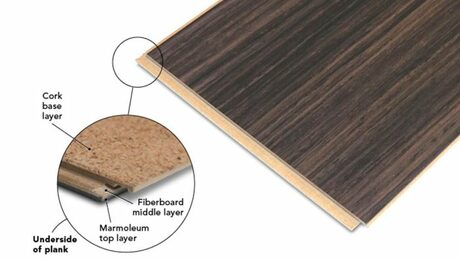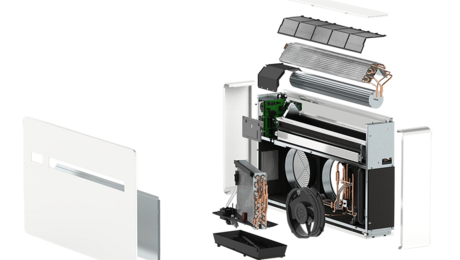Opinions on Desiccant Dehumidifiers
We have a 20×20 room as part of a calf barn that we keep a little above freezing with a 5kW electric heater. The floor is always wet from tracking in snow and washing pails. I’m wondering about using a desiccant dehumidifier to keep it a bit drier. A regular dehumidifier will just freeze up at that low of temperature. The heat from the unit will just offset the other heater.
Maybe a regular one with auto-defrost is just a good?
GBA Detail Library
A collection of one thousand construction details organized by climate and house part









Replies
Consider using a HRV instead. It will exhaust the moisture while retaining the heat.
> a 5kW electric heater
Consider using radiant heaters - technically the same efficiency but is much easier to direct to where it is needed.
Desiccant absorbs the moisture using a resin. Desiccant-based dehumidiers will work in low temperatures, but the downside is that the dessicant gradually loses effectiveness as it essentially "fills up" with water. Think of the desiccant like a bath towel -- once that towel is soaked with water, it can't dry anything off anymore. You can regenerate the desiccant in an oven but the problem is that it can only handle a relatively small amount of water before it's no longer functioning as a dehumifier. I think you'll find a desiccant-based unit won't be particularly effective because it will "fill up" pretty quickly.
I would try directing the warm air from your heater over the floor to dry it off, and then using an HRV as Jon suggested to exhaust some of the moisture from the interior to the outdoors.
Bill
Hi Bill,
I was thinking of the ones that continuously regenerate.
A desiccant dehumidifier that uses electric heat to regenerate is a horrible energy hog. In cold weather, HRV is a better option as Jon notes. If that's not enough, a little more heat could help, and a small minisplit heat pump would be an efficient way to do that.
The place that desiccant dehumidifiers really shine is if you can use solar heat or waste heat to regenerate--then they can provide dehumidification for only the cost of running the fans and a small motor.
Charlie,
I figured it wouldn't be any worse than the heater we're using now.
That's true actually--you'd get out more heat than the electricity you put in, so it would be an improvement over what you are doing now in both removing humidity and heating a little more efficiently. It just wouldn't be as good as a heat pump and an HRV ventilator.
>"That's true actually--you'd get out more heat than the electricity you put in, so it would be an improvement over what you are doing now in both removing humidity and heating a little more efficiently."
That's not actually correct. With heat pumps that have a separate unit outdoors, you get more heat out than you put in because they are MOVING some thermal energy from outside to inside. That's where that "extra" heat is coming from.
With a closed system, such as a dehumidifier, that is entirely indoors, the total heat output cannot exceed the input electrical energy. There is no way around this, it's just a pesky part of physics. You probably actually get a teensy bit less heat out than you would from a heater alone, since some of the input thermal energy is being used to indirectly condense water out of the air.
Of course now that I've written that, I notice a minisplit was mentioned, which would be one of those "get more out than you put in" heat pumps :-) A minisplit WOULD be more efficient than an electric resistance heater. That and an HRV would probably be your overall least cost option to condition the space.
Bill
Nope, it is correct. The additional heat that is put into the space by a dehumidifier is the heat of vaporization of the water that you condensed. Just as an evaporative cooler can cool a space without an outside connection, a dehumidifier releases that same heat per liter of water, in addition to heat from the electric energy. I've been through the calculations and could find them again but if I recall correctly, the effective COP of a typical energy star dehumidifier is about 2, which means a desiccant dehumidifier like likely less than 1.5. But as long as it is condensing water vapor it has a COP >1.
If Paul wants to point us to the specific model he's looking at we could easily enough calculate that COP.
Here's a previous thread where I explained this in more detail.
https://www.greenbuildingadvisor.com/question/dehumidification-vs-ventilation-in-an-existing-house
The heat of vaporization of water is 970 BTU/lb, so a 70 pint dehumidifier will produce about 70,000 BTU/day of heat just from the vaporization.
Yep, you're right -- I was thinking backwards, probably since I'm usually working with air conditioning with dehumidification effectively reduces cooling capacity (we only want sensible BTUs in datacenters). I probably should have thought of this since we like to use cooling towers to GAIN efficiency since the heat of vaporization helps to cool the return water from the tower. In the right conditions, it can even get the return water below ambient.
Thanks for catching my goof, BTW.
Bill
+1 on using a cold climate heat pump for the heating. It should pay for itself in increased efficiency. Would there be any issues with a thermostat setting of say 40F? I don't know.
I think gaining the heat of vaporization is a moot point because we also supplied the energy to evaporate the water in the first place!
I don't have a particular dehumidifier in mind, I was just wondering if anyone had experience with the desiccant ones.
You can think of it that way--you are regaining the heat of vaporization that you lost in evaporating it. But it's better than not regaining it.
Be aside from those nit-picks, here's what might be more useful: the best dehumidifier company is Thermastor--they have different lines that include desiccant and conventional. They could give you more advise on which route to take.
https://thermastor.com/about/contact/
Or, if you tell use the temperatures and humidity inside and out you are working with we might be able to get more specific.
https://thermastor.com/about/contact/
Looking at an Ecor Pro DryFan, looks like 850 watts for 70 pints/day (conditions?). $2300.
An advantage is that it will work when it's 35F and 90% RH inside and outside. In such conditions, a HRV will provide fresh air but do nothing for humidity.